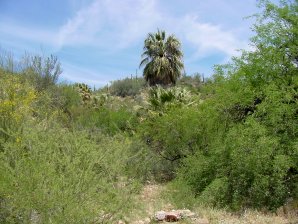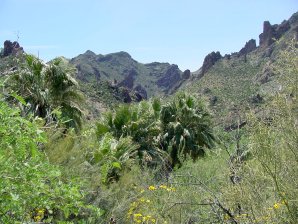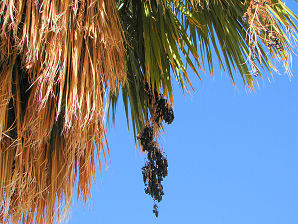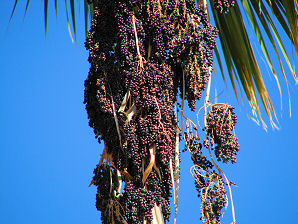Non - Xeriscape.
Common Landscape Plants. Shrubs, Flowers, & Trees.
For The Arizona Desert Environment
Pictures, Photos, Images,
Descriptions, & Reviews.
California Fan Palm, or Washingtonia Palm.
Washingtonia filifera.
We Are Proud Of Our SafeSurf Rating!
Click On Any Of The Following Links By Amazon.Com
To View Tools For Desert or Arizona Gardening. No Obligation!
 |
| California Fan Palm, or Washingtonia Palms Washingtonia filifera - Sun City. January 21, 2006. These Trees Can Grow Very Tall. |
|---|
 |  |
| There Is Only One Native Species Of Palm Tree In Arizona. It Is a Washingtonia robusta. Not A Washingtonia filifera. | These Were Found Growing At Castle Hot Springs In Hieroglyphic Mountains. They Are Washingtonia robusta. |
|---|---|
 | |
| California Fan Palms. Washingtonia filifera. Grow All Over Arizona At Most Of The Lower Elevations, | These Are Small Black Dates On A California Fan Palm Tree. Washingtonia filifera. |
 | |
| These Are Small Black Dates On A California Fan Palm Tree. Washingtonia filifera. | These Are Small Black Dates On A California Fan Palm Tree. Washingtonia filifera. |
California Fan Palm. We wish to thank Wikipedia, the free encyclopedia for some information used on this page. We share images and information with Wikipedia. The California Fan Palm Tree, scientific name Washingtonia filifera, is one of the most popular palms in subtropical climates because of its beautiful appearance and low maintenance. This is a large tree that can tolerate cold down to 15 F making it perfect for growing in zone 8b. The California Fan Palm can be grown in states like Alabama, Arizona, Arkansas, California, Georgia, Louisiana, Mississippi, Nevada, Oregon, & Texas. The Washingtonia filifera palm grows to about 59 feet in height & it can grow up to occasionally to about 82 feet under ideal moisture and climate conditions. Its leaf fronds are up to 6 feet long, made up of a petiole up to about 6 1/2 feet long, bearing a fan of leaflets about 4.9 � 6.6 feet long. They have long thread-like white fibers, called filifera-filaments, between the segments. When the fronds die they remain attached and drop down to cloak the trunk in a wide skirt. Sometimes these skirts are called; "Hula Skirts."These skirts can be the home to unwanted insects and animals. They are known to contain wasps, bees, rats, & even rattlesnakes! They also are fire hazards. The trunk is smooth but usually hidden by these retained old leaves that "skirt" the trunk unless removed. Washingtonia filifera can live from 80 to 250 years or more. The genus name honors George Washington, the first President of the United States. Another palm species, Mexican Fan Palm ( Washingtonia robusta ) is native to the oases and canyons of Arizona and California. An evergreen. It is sometimes grown in populated areas.
Here is a link to our web page about Mexican Fan Palm ( Washingtonia robusta ). The Washington Palm's we see all over the cities of Arizona are non-native. They are almost always, Washingtonia filifera palms.
Quick Notes:
Height: Up To 45 foot or more, frond spread to 15 feet, in cultivation. In the wild up to about 70 feet tall.
Trunk: Up To About 3 Foot Thick. Fatter trunk than W. robusta.
Bark: The Bark is dark brown, and the bark texture is furrowed.
Twig: Slender, reddish-brown some thorns, later developing an exfoliating gray film; buds reddish to gray and sharp pointed; leaf scars raised.
Flowers: On stalks extending beyond foliage, small, creamy, off-white flowers. Male and female flowers on the same Inflorescence.
Blooming Time: Mid March - June.
Fruit: Pea-sized black berries. Enjoyed by birds.
Leaves: Fan-shaped fronds, 3 - 6 feet across, gray-green; margins more stringy than W. robusta; tips of fronds arch down; most attractive when old yellowed fronds are allowed to accumulate against trunk. The leaves are grey-green, with cotton like threads on the leaves, and dark drown, heavily armed, shiny leaf bases.
Light: Full sun but can also grow in partial shade.
Water Requirements: It can also tolerate drought but does best in moist well drained soil. It can tolerate alkaline soil.
Fertilizer: Apply good quality palm fertilizer that has a continues release formula, twice a year during growing season.
Found: Isolated areas in the desert near water.
Elevation: 0 - 3,900 Feet.
Habitat: Southwestern North America, at seeps, desert bajadas, and springs.
Pests: Very Few. The fungal disease caused by Sphaerodothis neowashingtoniae, called diamond scale, can infect Washingtonia filifera and its hybrids, leading to loss of leaves and an even sparser crown.
Hardiness:
Soil pH requirements:
Miscellaneous: It is cold hardy to about 15-20 F and can tolerate frost. Propagated by seed. Photos Taken May 1, 2003. Castle Hot Springs. Sun City. January 21, 2006. Plant has spines or sharp edges; use extreme caution when handling.
California Fan Palms, or Washingtonia Palms, in Arizona can get their crowns blasted off by lightning since the trees often tower over neighboring trees. And Arizona has Monsoon storms. We have seen it happen!
|
We Are Proud Of Our SafeSurf Rating!
Click On Any Of The Following Links By Amazon.Com
To View Tools For Desert or Arizona Gardening. No Obligation!
| © 1966 - Present, Audrey, Eve, & George DeLange |





